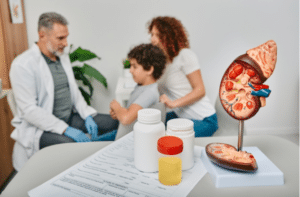Pediatric Urology: Can Kids Get Kidney Stones?

What Causes Kidney Stones?
Kidney stones can develop when there is a high concentration of crystal-forming substances in the urine. These include uric acid, oxalate, and calcium. When too much of any one of these is present in the urine, small particles stick together. The stone forms in the renal pelvis where urine collects before it travels to the ureter. It isn’t the presence of the stone in the kidney that causes pain; it is the passage of the stone through the ureter. This canal is small and delicate even in adults. It is especially small in children. When a kidney stone passes through the ureter, it can create a blockage of urine. Everything behind the blockage becomes swollen and irritated, resulting in unilateral pain.
Too much of a crystal-forming substance is the direct cause of a kidney stone, but what causes this buildup is equally important. Some of the reasons kidney stones form include:
- Not enough citric acid in the diet (fresh citrus fruits provide this)
- Not drinking enough water
- Eating too much salt
Health conditions that may increase a child’s risk of developing kidney stones include:
- Urinary tract infections
- Diabetes
- Obesity
- Thyroid conditions
- Kidney conditions
Do Kidney Stones Have to be Treated?
Sometimes, kidney stones can pass on their own. Until that time, it may be necessary to take over-the-counter pain medication as directed. It is also necessary to drink plenty of water. The child’s pediatrician may make other recommendations as well. However, lab tests and imaging should be performed to identify the location and size of the stone before a treatment recommendation is made. Some stones do require clinical intervention such as Extracorporeal Shock Wave Lithotripsy or Ureteroscopy to break up a stone so it can pass naturally.
UT Urology offers patient-centered pediatric urology care to restore comfort and peace of mind quickly. To schedule a consultation, contact our Chattanooga office at (423) 778-5910.

